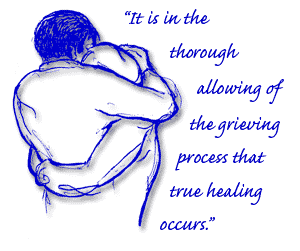 [This article was taken from http://www.grownups.co.nz/read/lifestyle/family/grief-process with some corrections in terms of theology – PB]
[This article was taken from http://www.grownups.co.nz/read/lifestyle/family/grief-process with some corrections in terms of theology – PB]
Grieving is an act of love. It begins when someone or something you love is lost, and the stronger the love the greater the grief. The act of grieving honours you and the significance of your loss.
The longer you live the more loss you experience. In order to grieve in healthy ways, you need to understand the stages of the grief process itself.
Shock
This is the body/mind’s way of saving you from the devastating pain of the loss, at least initially. It is a blessing at best, but at worst can become a long-term numbness to feelings that resembles a sort of living death. It will pass naturally as long as the other components of the grief process are honoured.
Denial
This is your mind’s attempt to protect you from the reality of the loss. You may lie to yourself and think about the person as if they were still alive. A certain period of denial is normal but if prolonged, it can keep you stuck and prevent resolution. There are many forms of denial, as varied as people are different from each other.
Anger
When you lose someone you love, it is natural to be angry for a period of time. You may be angry with the person for leaving you, angry with yourself for what you did not do to save them or angry with God for taking them away. You may just be angry at the unfairness and injustice of life. Healthy anger management techniques may be essential here.
Guilt
There seems to be a human tendency to blame yourself when something happens to a loved one. In loving someone, you automatically take some degree of responsibility for her or his welfare. It is only natural to question yourself for a period of time after your loved ones die. This is a normal part of the grief process, but it is extremely important that you move through it and don’t get stuck in this stage.
Pain And Sorrow
These feelings often exist throughout the entire grief process, and are the core feelings of grief. In the early stages, however, you are often distracted from your sorrow by denial, anger, guilt and the resulting confusion. Fear can also be a tremendous barrier to the experience of sorrow, triggering all of the defence mechanisms. To truly face and experience the pain and sorrow is necessary and healthy however, and it moves you forward in the grief process. Working with love is the key for moving through this phase, because only love has the power to move us to the depths of our being where the greatest loss is registered.
Release And Resolution
This stage of the grief process is accompanied by a sense of acceptance of the reality of the loss, a sense of “letting go.” There may also be a degree of forgiveness that occurs in this phase. The denial, guilt and anger stages are over, and the pain and sorrow is not as intense as it was before. Many people ask, “How long does it take?” The answer is different according to the severity of the loss and the health of the individual who is grieving. Grieving moves in cycles, and it may seem as if we are through for a substantial period of time. A birthday, anniversary or another loss can bring back many of the same feelings that were there when our loved one died. Any loss or low emotional period can bring back the feelings of loss, particularly if you have not reached resolution. When the release finally occurs, your entire body will feel it. I have watched many people go through emotional release in their grieving, and I am convinced that it is as much a physical, non-verbal process as it is verbal and conscious.
Return To the Willingness To Love
This is the final stage of the grieving process. Healing has occurred, and the grieving person is able to laugh again and to get involved in life. Fear can slow you down or even stop you at this point, because new love means the risk of new loss. By honouring and completing all aspects of the grief process, however, you will overcome your fear and move forward. This occurs through an appreciation for yourself and the life you are left to live. Nurturing your relationship with God is the best thing to do to help you through the entire grief process, and particularly as you move back out “into the world” after a period of grieving. Part of the return to love also includes remembering the love you felt for the one you lost. The love lives on and the anger, guilt, pain and sorrow fade away.
This final stage of the grief process is ultimately a spiritual one. It is a fact that all of us will die unless Jesus comes again while we are still alive. You need to live, laugh and love with this reality in mind. That’s where spirituality and faith come in. True security cannot be found in another person or in any external circumstances. You have to turn to God through Jesus Christ to ultimately find peace and security in a life that is only temporary.
